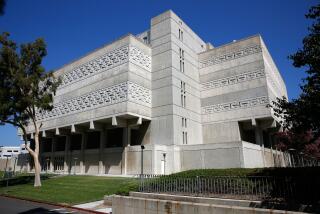Mass Murder Case Defense Gets Place to Analyze Clues
- Share via
Orange County Sheriff Brad Gates’ staff agreed Friday to convert the library of the department’s crime laboratory into a mini-crime lab so lawyers for murder suspect Randy Steven Kraft can independently analyze evidence against him.
But the question still remains whether Kraft’s defense team can complete its evidence tests in time for the Jan. 12, 1987, trial date. Kraft is accused of 16 Orange County murders.
Two weeks ago sheriff’s officials said they did not have the space to accommodate Kraft’s attorneys, so the attorneys asked Superior Court Judge James K. Turner to let them build their own crime lab.
But prosecutors and sheriff’s officials were not willing to let the defense team have access to the evidence without a Sheriff’s Department representative present to maintain control. And Kraft’s attorneys would not agree to that.
Responsible for Evidence
Friday, at Turner’s urging, prosecutors agreed to let a court-appointed special master be responsible for evidence turned over to defense experts, but only if the evidence remains at the Sheriff’s Department facilities.
Kraft’s attorneys have said all along that building their own crime lab was not the issue. They simply want access to the evidence.
“But we want to protect our confidentiality too,” said William J. Kopeny, one of Kraft’s lawyers.
Turner asked Larry Ragle, director of forensic sciences for the sheriff’s office, to supply him with a list of candidates for appointment as special master.
Ragle said the library would provide Kraft’s attorneys with about 300 square feet. The defense forensic expert, Robert R. Ogle Jr., had said that ideally, he would need 1,000 square feet.
Kraft’s attorneys agreed to provide their own laboratory equipment, primarily leased microscopes.
All Kraft’s defense costs are paid for by the state and county, since Kraft’s lawyers are court-appointed. Defense lawyers have refused to reveal any costs, including that of the proposed laboratory.
‘Minimal’ Conversion Cost
Assistant Sheriff Walter W. Fath said Friday that the county expense of converting the library into a work room will be “minimal.”
While prosecutors and defense lawyers were quick to work out the arrangements on the lab, Deputy Dist. Atty. James P. Cloninger was unhappy about Ogle’s testimony two weeks ago that it would take a minimum of seven months to analyze the evidence. That would almost certainly mean a postponement of the January trial date.
Cloninger on Friday asked to explore through testimony from Ogle why defense lawyers had not made arrangements to study the evidence sooner. “I’d like to know what he’s been doing for three years,” Cloninger said.
Kraft was arrested on May 14, 1983, when a dead Marine was found in his car during a routine traffic stop. Ogle was hired by the defense later that year.
Issue Ironed Out
But Kopeny insisted that since the crime lab issue had been ironed out, it was not necessary to question Ogle on Friday.
“The January date was an interim date set by Judge (Luis A.) Cardenas” at a hearing last May, Kopeny told the court. “Maybe we can move more quickly in analyzing the evidence, maybe we won’t be able to. But if we’re not ready, we’ll file a motion for a continuance and then Mr. Cloninger can bring up his arguments.”
Prosecutors have been saying for months that Kraft attorneys have not been as diligent as they should be in preparing for the trial.
The Kraft lawyers countered, in papers filed Friday, that they have been seeking access to evidence for several months but have been turned down.
The new mini-lab should be ready to turn over to the Kraft lawyers next week, Ragle said.
More to Read
Sign up for Essential California
The most important California stories and recommendations in your inbox every morning.
You may occasionally receive promotional content from the Los Angeles Times.













